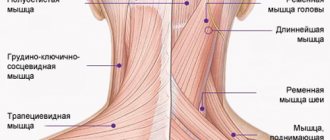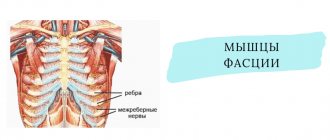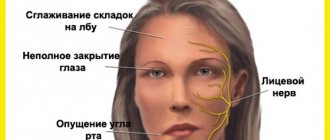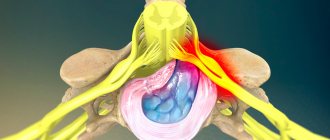Neurologist (algologist)
Vasilenko
Marina Gennadievna
25 years of experience
Head of the Pain Treatment Center, neurologist-algologist, member of the Society of Neurologists and Neurosurgeons, Russian Society for the Study of Pain, Association of Interdisciplinary Medicine, International Association for the Study of Pain (IASP)
Make an appointment
Occipital neuralgia is a disease of neurological origin, which is associated with irritation of the nerve roots in the occipital region. The pathology affects pairs of spinal nerves: the lesser and greater occipital nerves. The inflammatory process compresses and irritates these nerves, creating constant pain and reducing the quality of life of patients. Inflammation, according to the degree of origin, can be primary and secondary (against the background of lesions of the cervical vertebrae), and is also divided into neuralgia of the greater occipital nerve and neuralgia of the lesser occipital nerve.
Symptoms
Signs of inflammation of the occipital nerve are the following:
- throbbing pain in the head, ears, temples, lower jaw;
- dizziness and nausea;
- causeless lacrimation;
- discomfort from touching the affected area;
- a haunting feeling of cold;
- change in skin color.
Symptoms of occipital neuralgia:
- paroxysmal shooting pains;
- the duration of the attack is several hours;
- imitation of migraine symptoms;
- localization of pain in the occipital region;
- limitation of head mobility;
- increased sensitivity of the skin at the site of inflammation;
- change in skin color at the site of inflammation.
The pain can be constant, dull or burning.
A distinctive feature of inflammation of the occipital nerve is the presence of trigger points. The slightest pressure on them results in acute pain, so they must be protected from exposure until the disease is completely cured.
Are you experiencing symptoms of occipital neuralgia?
Only a doctor can accurately diagnose the disease. Don't delay your consultation - call
OCCIPITAL NEURALGIA SYNDROME
Ichilov Hospital / SPINE SURGERY / Occipital neuralgia syndrome
Occipital neuralgia
- is a symptom complex that combines signs of damage to the nerves entering the cervical plexus.
Most often, the greater occipital nerve is affected, less often the lesser occipital, greater auricular, nerve innervating the skin of the neck, and supraclavicular nerves are involved. The main clinical manifestation of this type of pathology is constant pain in the area of innervation of one or more nerves.
Occipital neuralgia syndrome can be either primary or secondary.
Secondary occipital neuralgia can occur against the background of diseases such as a brain tumor, trauma, infectious processes (meningitis, encephalitis), as well as against the background of systemic diseases (for example, lupus erythematosus).
The main causes of secondary occipital neuralgia are arthritis of the joints of the upper cervical vertebrae, gout, diabetes mellitus, inflammation of the blood vessels, neoplasms or pseudotumors of the posterior cranial fossa and cervical spinal cord, injury or compression of the greater and lesser occipital nerves or the second and third cervical nerve roots, meningitis , encephalitis, etc.
In some cases, the etiology cannot be established, then they speak of idiopathic occipital neuralgia.
The main symptom of occipital neuralgia is constant pain, usually aggravated by sneezing and coughing, as well as head movements, sometimes radiating to the supra- and subclavian areas, face, and scapula.
Some patients may experience discomfort in the eye area (on the corresponding side). The pain is most often unilateral, but sometimes occurs on both sides. The head is often in a forced position - the patient tilts it slightly towards the affected nerve.
In the zone of innervation of the nerve trunks involved in the process, polyhyperesthesia (increased all types of sensitivity) is usually noted and pain points are determined according to the course of the nerves. In this case, the skin can be so sensitive to touch that even a simple light touch can cause pain.
DIAGNOSTICS
Diagnosis of occipital neuralgia involves collecting complaints, medical history, conducting a thorough objective examination, and performing magnetic resonance and computed tomography.
TREATMENT
The goal of conservative treatment is pain relief.
In this regard, thermal and physiotherapeutic procedures, massage, anti-inflammatory drugs, and muscle relaxants are effective. Anticonvulsants such as carbamazepine and gabapentin can also provide a positive result.
Measures must be taken to eliminate the cause of secondary occipital neuralgia. Adequate rest is considered an integral element of therapy.
The method of blocking the occipital nerves using corticosteroid drugs (hydrocotrisone, dextamethasone and others) is used quite successfully to treat this pathology. However, here you should remember about the adverse reactions that occur during the use of these drugs.
For severe chronic pain and in the absence of a positive effect from conservative therapy, surgical treatment is indicated.
Microvascular decompression
Microvascular decompression involves removing compression of the occipital nerves.
In this case, microsurgical techniques are used. Decompression (removal of compression) can significantly reduce the sensitivity of the nerve roots, which leads to the elimination of pain.
Stimulation of the occipital nerves (neurostimulation)
Neurostimulation involves connecting thin wires to the nerve trunks, through which electrical impulses of a certain strength and voltage are applied. This blocks pain impulses from the occipital nerves to the brain.
Compared to surgical methods, neurostimulation is less invasive and has virtually no side effects.
Once remission is achieved, sanatorium treatment is recommended.
- Spine surgery in Israel
- Human spine
- Spinal diseases
- Spine - Spina Bifida
- Spine – Spondylolisthesis
- Spine - Paget's disease
- Spine – Cauda equina syndrome
- Spine - Syringomyelia
- Spine – Spinal stenosis
- Spine – Scoliosis
- Occipital neuralgia syndrome
- Spinal Cord – Vascular Malformations
- Spine – Herniated discs
- Spine – Injuries
- Spinal Cord - Injuries
- Spine – Tumors
- Spinal Cord – Tumors
- Spine and spinal cord – Metastatic lesions
- Spine – Examination methods
- Therapeutic and diagnostic procedure – Epiduroscopy
- Spine and spinal cord – Surgery
- Spine – Minimally invasive surgery
- Kyphoplasty or vertebroplasty of the spine
- Spine surgery – New methods of treating spinal hernia
- Spine surgery – Spinal fusion
- Spine Surgery – Laminectomy
- Spine Surgery – Microdiscectomy
- Spine surgery – Laser vaporization of spinal discs
- Spine surgery – Intradiscal electrothermal therapy
- Spine surgery – Surgical treatment of scoliosis
- Spine Surgery – Treatment of Tumors
- Spine surgery – Surgery of intramedullary tumors
- Spine surgery – Surgery of extramedullary tumors
- Spine Surgery - Application of Robotics
- Spine Surgery – Recovery After Surgery
- Spine surgery at Sourasky Medical Center in Tel Aviv
- Dr. Zvi Lidar – neurosurgeon
- Spine surgery - Best medical centers in Israel
- Dr. Ilya Pekarsky – neurosurgeon
- Spine treatment in Germany
- Dr. Gilad Regev – orthopedic surgeon
- Dr. Ran Lador – spinal surgeon
Diagnostic methods
If inflammation of the occipital nerve is suspected, the following is carried out:
- initial examination;
- collection of clinical picture information;
- collection of patient complaints;
- clarification of the conditions for the appearance of symptoms of inflammation of the occipital nerve;
- identification of concomitant diseases.
Instrumental diagnostics are based on the use of MRI, CT and radiography.
Seeking help from a doctor
It is always easier to get rid of the root cause of a disease than to fight the consequences for a long time. Therefore, at the first signs of inflammation of the occipital nerve, treatment will be prescribed by a neurologist. At the Academician Roitberg Clinic, experienced specialists will provide you with the necessary assistance in eliminating the symptoms of occipital neuralgia and treating any type and etiology.
The main causes of damage to nerve fibers that can lead to inflammation:
- Pathologies of the cervical spine, for example, damage to the intervertebral joints, osteochondrosis, herniated intervertebral discs, bone tumors.
- Neck injuries, traumatic brain injuries.
- Prolonged tension in the neck muscles.
- Diabetes mellitus is a disease in which disturbances occur in small vessels, as a result, nerve fibers cease to receive sufficient amounts of oxygen and nutrients.
- Some infectious diseases.
- Inflammatory processes in blood vessels.
People who have a constantly tense neck due to prolonged stay in a monotonous position (working at a computer) and frequent similar movements are more prone to damage associated with pathological changes in the cervical vertebrae and muscles.
At the Medical Center International Clinic Medica24, a diagnosis of occipital nerve neuritis will be quickly and professionally carried out, and our neurologists will prescribe effective treatment for you.
We will call you back, leave your phone number
Message sent!
expect a call, we will contact you shortly
Treatment of the disease
Treatment of the occipital nerve involves relieving muscle tone, inflammatory processes and pain impulses. It has several directions:
- medications are used to relieve pain, muscle spasms and inflammation, such groups of medications as anti-inflammatory, muscle relaxants, anticonvulsants (if necessary), steroids, analgesics, B vitamins are used;
- physiotherapy is aimed at warming;
- therapeutic and physical training complex of exercises;
- massage;
- manual therapy;
- acupuncture;
- Surgery is a last resort method of treatment when all other methods have not had the desired effect.
An important step in treating inflammation is treating the root cause of the disease. Such an integrated approach to the symptoms and treatment of occipital neuralgia brings the maximum positive effect.
How can you fight the disease using traditional methods?
How to treat occipital neuralgia with folk recipes? This treatment takes place at home and is aimed at reducing severe pain. You can use the following folk remedies:
- ointment from lilac buds - a thick decoction of lilac mixed with pork fat, rubbed into areas of inflammation on the neck and head;
- dream herb infusion – brew 2 tablespoons of dry herb with a glass of boiling water and leave for 24 hours, you need to drink it in one day;
- Take 1 tbsp of willow bark decoction. l. from 3 to 5 times a day;
- alcohol compresses.
Treatment of neuritis of the occipital nerve
Typically, treatment of the disease begins with the following measures:
- Anti-inflammatory and painkillers.
- Muscle relaxants are medications that help relax the neck muscles.
- Massage.
- Physiotherapeutic procedures.
- Warmth on the neck and back of the head.
- Creating rest for the neck muscles.
In each case, the doctor selects treatment individually. If the pain, despite the therapy, does not go away, blockades are used: anesthetics and steroidal anti-inflammatory drugs are injected into the area of the affected nerve.
In the most severe cases of neuritis, the doctor may recommend one of the following types of surgical treatment:
- Rhizotomy is an intervention during which the affected nerve root is destroyed, thereby blocking pain.
- Neurolysis is damage to nerve fibers using high, low temperatures or special chemicals, thereby blocking the transmission of pain impulses.
- Decompression is the elimination of compression of nerve fibers by surrounding tissues.
This disease does not pose a threat in terms of severe complications, even if it is not treated at all. However, it is accompanied by pain, which reduces the quality of life and prevents you from fully engaging in work and everyday activities.
Proper treatment can effectively manage painful symptoms. Make an appointment with a neurologist. At the medical center International Clinic Medica24 this can be done any day, at any time of the day by phone.
The material was prepared by Natalya Yurievna, a neurologist at the international clinic Medica24, Candidate of Medical Sciences Lasch.
Disease prevention
Preventive measures should be permanent:
- rational organization of the work process;
- systematic physical exercise;
- avoid injuries and hypothermia;
- improving the diet with the addition of the maximum amount of vitamins and minerals;
- maintaining the correct neck position while working;
- timely treatment of respiratory and infectious diseases;
- rational distribution of physical activity;
- preventive treatment of concomitant diseases if present.
In our clinic, consultations are conducted by highly qualified neurologists. You can make an appointment with them on the website or by phone. JSC "Medicine" (clinic of academician Roitberag) is located at the address: 2nd Tverskoy-Yamskaya lane, 10, Mayakovskaya metro station.






